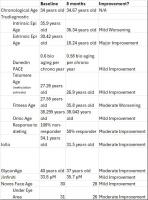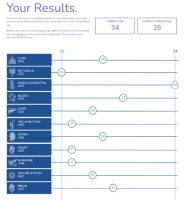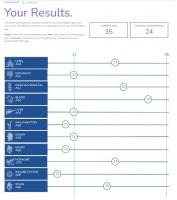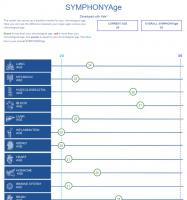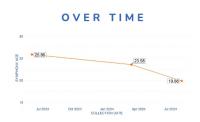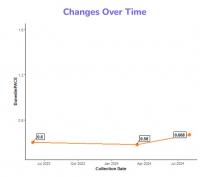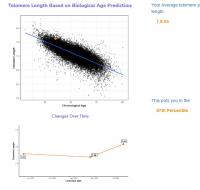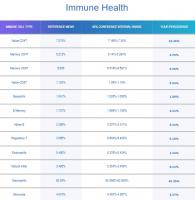Introduction: When I turned 34 in 2023 I decided it was time for me to upgrade my fight against aging. I had been following longevity research for the prior 12 years, but had not done anything to prevent aging other than the lifestyle basics of Mediterranean diet, intermittent fasting, mild calorie restriction, exercise, sleep, and restricting consumption of alcohol and sweets.
Testing: So in July 2023 I sent off my blood for a TruAge Complete test by Trudiagnostic to establish my baseline values. This test measures (1)intrinsic epigenetic age (Horvath age), (2) extrinsic epigenetic age (Horvath Age + white blood cell composition), (3) Dunedin PACE, (4) methylation approximation of Telomere length, (5) OmicAge, and (6) epigenetic estimates of exercise fitness, responsiveness to weight loss, smoking, and alcohol consumption. In addition to TruDiagnostic, I took tests with Iollo (test that estimates age by measuring the levels of 600+ metabolites in the blood), Jinfiniti (test that measures cellular NAD+ levels), and GlycanAge (test that estimates age based on the quantity and composition of Glycans). I also uploaded pictures of my face to the Novos Face Age algorithm (a machine learning algorithm that predicts your age based on pictures of your face).
Protocol: My protocol consisted of the following, taken every day: (1) 600 mg of liposomal Ca-AKG, (2) 8mg of liposomal spermidine, (3) 1 gram of liposomal vitamin c, (4) a liposomal blend of 125mg of NMN, 90 mg of NAD+, and 80 mg of NR, (5) 75 mg of liposomal green tea extract standardized to contain 70% EGCG. If you would like to know the brand I used, send me a private message. I chose this brand after considering their product selection, their liposomal formulations, and their regularly published lab results confirming the purity of their products and the accuracy of their labeling.
Research: I chose this protocol based on research showing that: (1) AKG is able to enhance the function of the TET enzymes and thereby remove harmful epigenetic markers, as well as researching showing that it prolonged the lifespan and healthspan of rats, (2) spermidine is able to stimulate autophagy, help preserve telomere length, and prolong the lifespan and healthspan of mice, (3) vitamin c acts as a cofactor for the TET enzymes and may enhance the effectiveness of AKG, in addition to many other health benefits, (4) NAD+ is able to activate the sirtuins and thereby improve dna repair and maintain telomere length, and (5) EGCG helps prevent cancer and may have some benefits for maintaining the epigenome.
For the next 8 months I followed the above protocol while trying keeping my lifestyle the same. My lifestyle changed somewhat because during those 6 months because I caught two nasty respiratory viruses that threw off my exercise protocol (this winter was rough!).
Results: Attached at the bottom of this post you will find a picture of a chart with the results of my lab tests. Subjectively, while on this protocol I experienced increased energy, increased endurance in the gym, slightly decreased need for sleep, less grogginess in the morning, and a large reduction in eye puffiness/inflammation.
Analysis of Results:
My intrinsic epigenetic age increased slightly less than would be expected for a 8 month period, but I was not able to achieve a reduction here. However, research shows that intrinsic epigenetic age is not very responsive to lifestyle interventions. Not even calorie restriction makes a significant change to it. Some research suggests that beneficial epigenetic changes actually get picked up as aging by this clock.
My extrinsic epigenetic age declined substantially. Research shows that extrinsic epigenetic age is a better predictor of lifespan than intrinsic epigenetic age, so I am glad I achieved a strong result here.
My Dunedin PACE was already excellent before starting my protocol (0.6 is supposed to be the lowest score a person can achieve on this test) but somehow I managed to improve my score even further to 0.58!
My telomere length (as measured by epigenetics) improved slightly. The reliability of this measure of telomere length is subject to debate, but I am glad to see an improvement here anyway.
My fitness age declined significantly. This is not surprising, given that I endured two strong respiratory viruses that weakened me and kept me from the gym during part of the protocol period.
My OmicAge improved slightly. This is a very new measure of epigenetic age and its reliability is subject to much debate. According to TruDiagnostic, my OmicAge is lower than 85% of people at my chronological age. This suggests that OmicAge must be systematically overestimating the epigenetic age of test subjects, because my OmicAge is 4 years higher than my chronological age.
My response to dieting (as measured by my epigenetics) improved greatly. I had benefited from dieting before during a weightlifting "cut" so I am suspicious of my initial test result that labeled me as a diet "non-responder." Regardless, I am happy with the improvement in this area.
My Iollo metabolomic age, which is derived from the levels of over 600 chemicals in my blood, decreased moderately. I was very pleased with this result, because if gene expression is improving (reflected by improvements in epigenetic age) then we would expect for the chemicals circulating in my blood to have a more youthful composition. Unfortunately, I think this test will be less helpful going forward, because I realized that my chronological age is one of the variables used by Iollo to calculate my metabolomic age.
My GlycanAge declined moderately, reflecting lowered levels of inflammation in my body. My GlycanAge started out quite higher than my chronological age, perhaps because I suffer from mild psoriasis and from gut dysbiosis. Although its interesting that my CRP results are always optimal.
My NAD+ levels barely improved. I think because my dosage was too low. I was taking half the recommended dosage on the bottle.
My Novos Face Age improved mildly, driven largely by the decrease in my under-eye age. I don't put much stock in the total face age score, because I found that I score much lower when I am clean shaven vs when I have stubble. However, I do think their measurement of the under eye area is reliable. Note though that sleep deprivation or dehydration can change the under-eye scores.
Next Steps:
I am very pleased with the results of my protocol and view it as a success! For next steps, I will continue with my protocol and my regular testing, but I will be increasing my dosage of NAD+ precursors. I will also be adding in the following supplements on alternating days: astaxanthin, sulforaphane, pqq, leucine, vitamin b6, pterostilbene, liposomal glutathione, vitamin d, low dose lithium, and food-derived mixed carotenoids.
Edited by dlewis1453, 27 May 2024 - 10:31 PM.































